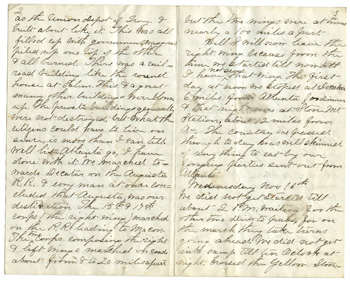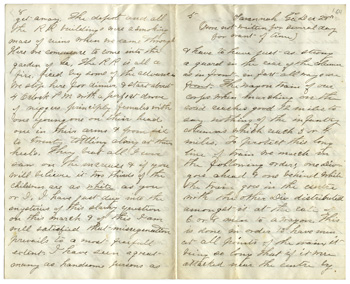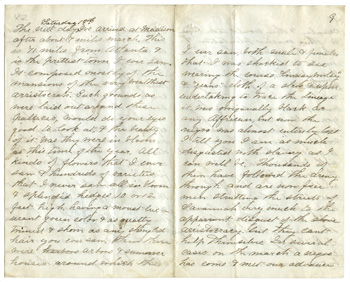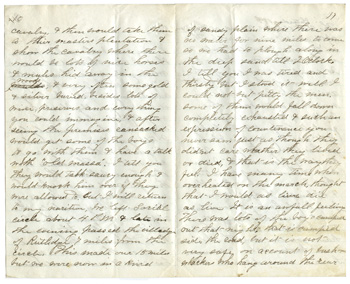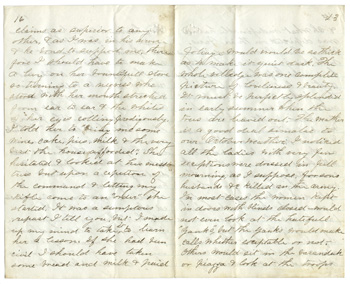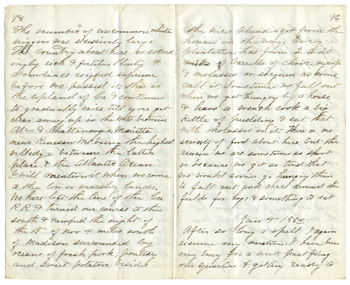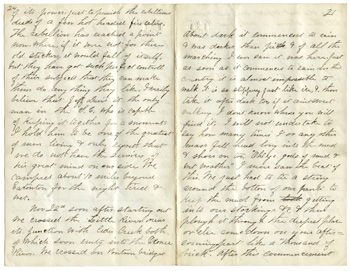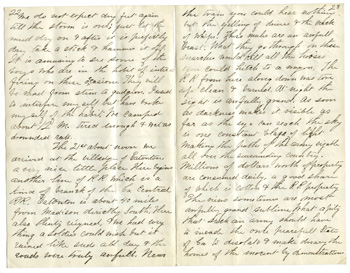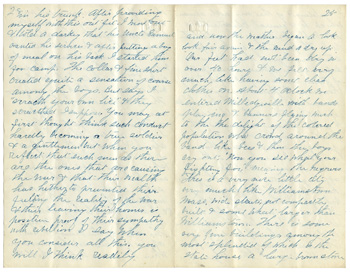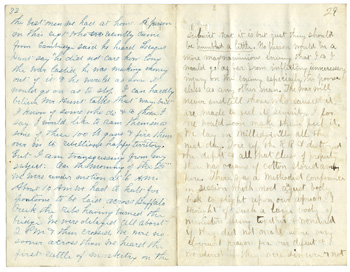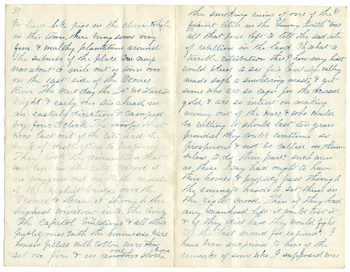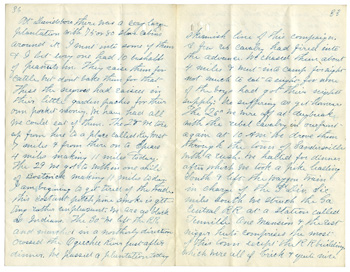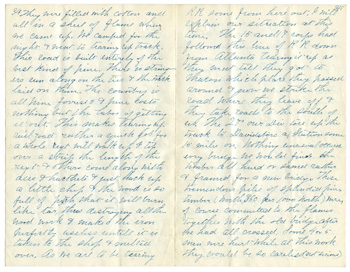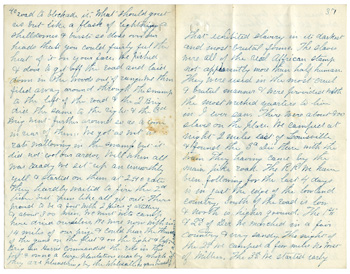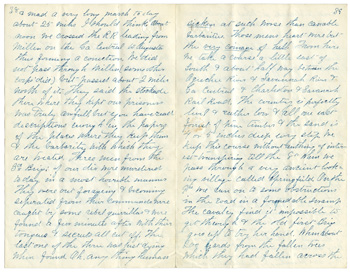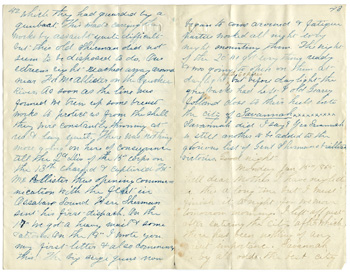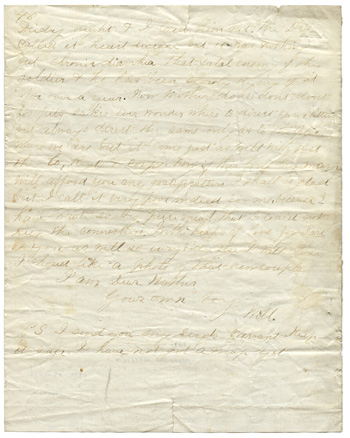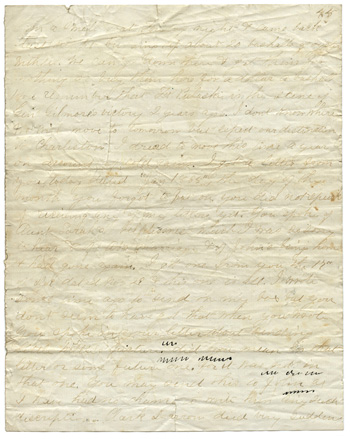Will Fisher to his mother
Camp 4 miles from Savannah, Georgia
December 18, 1864 thru January 15, 1865
Dear Mother,
I wrote you today, but have not mailed it yet, cannot till tomorrow, but as I promised you to give you a description of our journey, I will commence & write whenever I get a chance. I propose to take what I don’t recollect from my diary for I have kept one this march all through.
We started the 15th and about 7 o’clock AM we were just outside the city & it well in flames. It was a terrible sight I tell you. The passenger depot of Atlanta was as large as the Union depot of Troy & built about like it. This was all filled up with government wagons piled up one top of the other & all burned. There was a railroad building like the roundhouse at Salem, this & a great many other buildings were blown up. The private buildings generally were not destroyed, but what the citizens could have to live on since, is more than I can tell.
Well, let Atlanta go, I have done with it. We marched towards Decatur on the Augusta RR & every man at once concluded that Augusta was our destination. The 15th & 17th Corps (the right wing) marched on the RR leading to Macon. The two corps composing the right & left wings marched on roads about from 8 to 20 miles apart, but the two wings were at times nearly 100 miles apart.
Well, I will now leave the right wing because from the time we started till now I have not seen that wing. The first day at noon we stopped at Decatur 6 miles from Atlanta for dinner & that night were at Stone Mt. Station, about 12 miles from Atlanta. The country we passed through today was well skinned of any thing to eat by our foraging parties sent out from Atlanta.
Wednesday Nov. 16th
We did not get started till about 2 PM waiting for the other two divs. to pass, for on the march they take turns going ahead. We did not get into camp till ten o’clock at night. Crossed the Yellow Stone River just before going into camp.
Thursday 17th
Marched through a country today where there was some forage. We go out & shoot a hog & get some sweet potatoes. We have to do this on every sign of stopping for a meal or for the night for we are loaded so heavy that we cannot carry much provision.
Passed through a place called Sheffield. It is the custom in this country to have a name for the smallest imaginable kind of place. The place mentioned above for instance consists of one solitary building, two stories, having a very naked appearance without a pane of glass unbroken.
We marched with the train to guard it from flank attacks by guerrillas. You see we have no rear here.
Savannah, Ga., Dec 28
(Have not written for several days for want of time.) & have to have just as strong a guard in the rear of the column as in the front. In fact all maybe are front.
The wagon train of our corps when marching on the road reaches good 12 miles to say nothing of the infantry columns which reach 3 or 4 miles.
To protect this long line of train we march in the following order: one div. goes ahead & one behind while the train goes in the center with the other div. distributed amongst it at the rate of 6 or 8 men to a wagon. This is done in order to have men at all points of the train. It being so long that if it were attacked near the center by a body of cavalry they could raise the “old Harry” before assistance could come from either end of the train. In marching this way the advance starts at day break and make from 15 to 18 miles, & get into camp by 4 o’clock, & the rear do not get started before 2 or 3 o’clock PM & get into camp between midnight & the next morning.
On this march we have intended to make about 15 miles a day & have done it full. The divs. take turns going in rear so to divide the hard part of it equally.
We have had the best of weather all the way with the exception of two days. To this one thing a good deal of our success is owing, for a long rain would have rendered the roads impassible. The mud dries up very quick however, in this country.
Friday 18th
Had one of the toughest tramps on record. Marched in rear of the train. Started about 9 AM. Did not close up to the advance yesterday by some 6 miles. About 4 miles after we started, we crossed the Ulcofauhauchee River (Indian name) a stream about as large as the Owl Kill. They call them all rivers here.
About 4 miles on we came to a very pretty town called Social Circle. This is 51 miles from Atlanta & has been the western limit of the Rebels running the cars on this line of RR. The last train left about 5 minutes before our cavalry came in. They left considerable stuff on the depot steps which they could not get away. The depot and all the RR buildings were a smoking mass of ruins when we came through.
Here we commence to come into the garden of Ga. The RR is all afire, fired by some of the advance. We stop here for dinner & start about 4 o’clock PM a perfect drover of niggers, principally females with one young one on their heads, one in their arms & from six to twenty toddling along at their heels. They beat all I ever saw on the increase & if you will believe it, two-thirds of the children are as white as you or I. I have just dug into the mysteries of this slavery question on this march & of this I am well satisfied, that miscegenation prevails to a most fearful extent. I have seen a great many as handsome persons as I ever saw, both male & female that I was shocked to see wearing the course “linsey-woolsey” & “jeans” cloth of a slave, & upon undertaking to trace the lineage it was originally black as any African, but now the negro was almost entirely lost. I tell you, I am as much disgusted with slavery as I can well be.
Thousands of them have followed the army through and are now free men strutting the streets of Savannah very much to the apparent disgust of the slave aristocracy, but they can’t help themselves.
In several cases on the march a negro has come & met our advance cavalry & then would take them to their masters plantation & show the cavalry where there would be lots of nice horses & mules hid away in the woods & very often some gold & silver buried, besides lots of wine, preserves and everything you could imagine, & after seeing the premises ransacked would get some of the boys to go with them and have a talk with “old massa.” I tell you they would talk saucy enough & would knock him over if they were allowed to.
But I will return to my narrative. We left Social Circle about 4 PM & late in the evening passed the village of Rutledge 7 miles from the Circle. This made our 15 miles but we were now in a kind of sandy plain where there was no water for nine miles to come so we had to plough along in the deep sand till 2 o’clock. I tell you I was tired and thirsty, but I stood it well. I could not but pity the men. Some of them would fall down completely exhausted & such an expression of countenance you never saw. Just as though they didn’t care whether they lived or died & that is the way they feel. I have many times, when over-heated on the march, thought that I would as leave die as live. It is an awful feeling.
There was lots of the boys camped out that night, that is camped by the side of the road, but it is not very safe on account of bushwhackers who hang around the rear.
Saturday 19th
The next day we arrived at Madison after about 7 miles march. This is 71 miles from Atlanta & is the prettiest town I ever saw. It is composed mostly of the mansions of the very wealthiest aristocrats. Such grounds as were laid out around these palaces, would do your eyes good to look at & the beauty of it was they were in bloom at this time of the year. All kinds of flowers that I ever saw & hundreds of varieties that I never saw, all in bloom, & splendid hedges 10 or 12 feet high, having a most luxuriant green color & as neatly trimmed & shorn as any shingled hair you ever saw. Then there were arbors & summer houses, around which the foliage would be so think as to make it quite dark. The whole village was one complete picture of loveliness & beauty. It must be perfectly splendid in early summer when the trees are leaved out. The weather is a good deal similar to our October weather.
I noticed all the ladies with very few exceptions were dressed in full mourning, as I suppose for sons, husbands, &c killed in the army. In most cases the women kept in doors with blinds closed – would not even look at the hateful “Yanks," but the Yanks would make calls whether acceptable or not. Others would sit in the verandah or piazza & look at the troops. Oh, what indefinable hatred was depicted on their faces. When Gen. Slocum rode through with his gay and dash-y staff he would lift his hat so graceful to these ladies & smile, while they looked as sour & would not notice it.
I am not so much of a hand to talk with these kind of citizens as some, because I cannot put on so much “cheek” as they call it, but I did talk with some of these & with one the conversation got quite spirited. She was a lady about 30 years old, & splendid looking & appearing lady. I went to the door & asked her (as she was the one who answered my ring) if “I could buy any refreshments there?” She pouted about & replied that “She could not feed the murderers of her husband & the hateful enemies of the South.”
Whew! Here was spunk in good earnest & I was at some loss to know what was the proper course to take, but resolved not to be bullied off in that manner so says I, “Madam, considering the fact that you are completely in the power of those “hateful enemies, I think you are very independent indeed.” I further told her “We did not come there to plunder & destroy, nor in the least to harm defenseless women & children, but we must be respected wherever we went.”
I then told her, that by the appearance of things that place had furnished its share of means to carry on the war for rebellion, and that I considered Uncle Sam’s claims as superior to any other, & as I was in his service & he bound to support me, therefore I should have to make a levy on her bountiful store.
So turning to a negress who stood with her mouth stretched from ear to ear & the whites of her eyes rolling prodigiously, I told her to “bring me some wine, cake, pies, milk & the very best the house afforded.” She hesitated & looked at her mistress but upon a repetition of the command & letting my rifle come to an “order” she started.
It was a sumptuous repast, I tell you, but I made up my mind to take it to learn her a lesson. If she had been civil I should have taken some bread and milk & paid her any reasonable price for it. While eating she told me her husband was killed at Gettysburg. I’ll warrant he had done the same thing in Maryland & Penn.
When we entered the town we found an institution called a “calaboose.” A brick concern where they flogged niggers. The floors were covered with old dry blood similar to a slaughter house. There were rings & staples in the floor & walls to tie them up to. We brought a few bale of cotton across the way & threw them in & set fire to it, & then battered the walls down with sticks of timber to show our scorn for it. Every nigger that was in it followed the army off. The number of uncommon white niggers was excessively large.
The country about here is exceedingly rich & fertile. Plenty & abundance reigned supreme before we passed it. This is the upland of Ga. & continues to gradually raise till you get clear away up in the mts. between Atlanta & Chattanooga. Marietta, near Kenesaw Mt. being the highest village between the latter place & the Atlantic Ocean.
I will mention it when we come to the low or marshy lands. We here left the line of the Ga. RR & turned our course to the south & camped the night of the 19th of Nov. 4 miles south of Madison surrounded by oceans of fresh pork, poultry and sweet potatoes, besides the nicer plunder got from the houses on the way.
Every plantation has from 2 to 20 barrels of choice syrup & molasses, or sorghum as some call it. Sometimes we pull out, when we get hungry, by a house & have a wench cook a big kettle of pudding & eat that with molasses on it. There is no scarcity of food about here, but the reason we are sometimes so short is because we get so tired that we would sooner go hungry than to fall out and chase around the fields for hogs & something to eat.
Jan. 4th, 1865
After so long a spell I again resume my narrative. I have been very busy for a week past fixing our quarters & getting ready to take a little comfort. The capt. has got his quarters up & I am again performing the duties of clerk. We stopped at our camp of the 19 of Nov, 4 miles from Madison.
Nov. 20th, 1864
We started about 11 AM & marched due south through an uninteresting section of the country. Were delayed by bad places in the road. On a march, if one wagon gets stuck in the mud, the rest cannot pull out and go by, so they all have to wait till they get it out, or in case it is stuck too bad, or the mules give out, then they just set fire to the wagon, cut the mules throat & Uncle Sam is out a rig worth $1200 in no time. That’s the way things go in the army, no leaving things behind for Rebels to get hold of.
About dark it commenced to rain & was darker than pitch & of all the marching I ever saw, it was here. Just as soon as it commences to rain in this country it is almost impossible to walk, it is so slippery, just like ice, & then take it after dark, too, if it ain’t sweat walking I don’t know where you will find it. I will not undertake to say how many times I, or any other, man fell head long into the mud & shoes on too. “Oh! Ye gods of mud & wet weather.” I never saw the beat of this. We just had to tie a string around the bottom of our pants to keep the mud from getting into our stockings &c, & then plough it through the deepest place or else come down on our after-coming part like a “thousand of brick." After this commencement we do not expect dry feet again till the storm is over, just let the mud dry on & after it is perfectly dry, take a stick & hammer it off. It is amusing to see some of the boys who are in the habit of interfering on these occasions. They will be mud from stem to gudgeon. I used to interfere myself but have broke myself of the habit. We camped about 12 PM tired enough & wet as drowned rats.
The 21st about noon we arrived at the village of Eatonton. A very nice little place. Here begins another line of RR, which is a kind of branch of the G.A. Central RR. Eatonton is about 40 miles from Madison directly south. Here also, plenty reigned & we had everything a soldier could wish, but it rained like suds all day & the roads were truly awful.
Near the train you could hear nothing but the yelling of drivers & the crack of whips. These mules are an awful beast. What they go through on these marches would kill all the horses you could hitch to a wagon.
The RR from here along down was tore up clean & burned. At night the sight is awfully grand. As soon as darkness makes it visible as far as the eye can reach, the sky is one constant blaze of light, making the path of the army visible all over the surrounding country.
Millions of dollars worth of property are consumed daily, good share of which is cotton & the RR property. The views sometimes are most awfully grand & sublime. What a pity that such an army should have to invade the once peaceful state of Ga. to desolate & make dreary the homes of the innocent by demonstrations of its power just to punish the rebellious deeds of a few hot headed fire eaters.
The rebellion has reached a point now where if it were not for these old stickers, it would fall of itself, but they have got such perfect control of their subjects that they can make them do anything they like. I verily believe that Jeff Davis is the only man in the S. C. who is capable of keeping it together for a moment. I hold him to be one of the greatest of men living & only regret that we do not have the services of his great mind on our side.
We camped about 10 miles beyond Eatonton for the night, tired & wet.
Nov. 22nd, 1864
Soon after starting out, we crossed the Little River near its junction with Cedar Creek, both of which soon empty into the Oconee River. We crossed on pontoon bridges, and now the weather began to look fair again & the mud to dry up.
Our feet had not been dry in over 40 hours & we felt very much like having some clean clothes on. About 4 o’clock we entered Milledgeville with bands playing & banners flying much to the delight of the colored population who crowd around the band like bees & then the boys cry out, “Now you see what your fighting for.” Meaning the negroes.
This is a very nice little city, very much like Williamstown, Mass., wide streets, not compactly built & somewhat larger than Williamstown. There is some very fine buildings, among the most splendid of which is the State House, a large brown stone building & of that very noble appearance which is a general characteristic of all public buildings throughout the U.S. The penitentiary is also a fine structure.
Some of the residences are superb in the extreme. A good portion of them are large flat roofed, 2 story houses with a portico running clear around the house & the whole height of both stories, with splendid Grecian and Gothic columns ornamented with plaster paris.
Inside the finish just goes ahead of anything I ever saw. I was in one of the nicest houses in the place soon after we got into town & the folks had all left & left everything behind in their haste to depart. I went into the parlor but it would be useless to undertake to describe the splendor of it. The walls were of plaster of paris & all around the edge of the ceiling the ornamental work was of the most exquisite kind & a most magnificent chandelier hung from a plaster of paris circle, all the little nicks and panels of which were gilded with gold. The window curtains were of white satin I should think, with a border of black for mourning. The furniture was of the richest imaginable kind & of English or French manufacture.
After looking at everything I went up stairs & found a trunk full of gentlemen’s clothing which I sprung open & after providing myself with an outfit of shirts, drawers, socks, choker collar & neck tie included, I threw my old (& I am afraid lousy) clothes in to it. I locked it up & left. The owner of the trunk I am afraid will turn up his nose some when he comes to find the clothes in his trunk.
After providing myself with this outfit, I went out & told a darkey that his Uncle Samuel wanted his services & after putting a bag of meal on his back I started him for camp. The collar & fine shirt created quite a sensation of course among the boys. But, says I, “scratch your own lice” & they scratched, I suppose.
You may at first thought think such a conduct hardly becoming a true soldier & gentleman, but when you reflect that such men as these are the ones that are causing the war & that their wealth has hitherto prevented their feeling the reality of the war & their leaving their homes is positive proof of their sympathy with rebellion, I say when you consider all this you will, I think, readily submit that it is but just that they should be humbled a little. No person would be a more magnanimous enemy than I & I would go as far from inflicting unnecessary injury on the enemy, especially the poorer class, as any other man. This war will never end till those who caused it are made to feel its severity. I, for one, would soon make them feel it.
We lay in Milledgeville all the next day. Tore up the RR & destroyed the depot & all that class of property. There was oceans of cotton stored away here.
There was a Methodist Conference in session which most august body took to flight upon our approach. I thought of such a large body of ministers being together & wondered if they did not make some very eloquent prayers for our defeat & wondered if they were sinners or not.
We lived like pigs in the clover while in this town, there being some very fine & wealthy plantations around the suburbs of the place. Our camp was about a mile out of town over on the east side of the Oconee River.
The next day, the 24th, we started bright & early, our div. ahead, in an easterly direction & camped by four o’clock. The troops that were last out of the city had the work of destruction to perform. They took the ammunition that was left in the city & drove it in wagons out onto the middle of the highest bridge over the Oconee & threw it through the windows into the river. The capitol buildings & all other public ones, with the immense warehouses filled with cotton, were set on fire & in one short hour the smoking ruins of one of the fairest cities in the “Sunny South” was all that was left to tell the sad tale of rebellion in the land.
Oh, what a terrible retribution this? How my heart would bleed to see fair Cambridge valley made such a smoldering mass, & yet some who are so eager for the accursed gold & are so intent on making money out of the war, & who would be willing it should last ten years provided they could continue so prosperous & not be called on themselves to do their part, such men as those, I say, had ought to have their homes & property pass through the enemy’s hands to set them in the right mood. Then, if they had any manhood left, it would test it & if they did have, they would fight till the “last armed foe expired.”
I have been surprised to hear of the remarks of some who I supposed were the best men we had at home. A person in this regt. who recently came from Cambridge said he heard Leagus Hunt say “he did not care how long the war lasted, he was making money out of it & he would as soon it would go on as to stop.” I can hardly believe Mr. Hunt talks that way, but I know of some who do & to those I say I would like to ram them into some of these 100 lb guns & fire them into rebellion’s happy territory. But I am transgressing from my subject.
On the morning of the 25th we were under motion at 6 AM. About 10 AM we had to halt for pontoons to be laid across Buffalo Creek, the Rebs having burned the bridge. We were delayed till about 2 PM & then crossed. We were no sooner across than we heard the first rattle of musketry on the skirmish line, of this campaign. A few Reb cavalry had fired into the advance. We chased them about 4 miles & went into camp for night. Not much to eat tonight for none of the boys had got their night’s supply. No suffering as yet however.
The 26th we were off at daybreak, with the Rebel cavalry in our front again. At 10 AM we drove them through the town of Sandersville with a rush. We halted for dinner after which we took a hike leading south & left the wagon train in charge of the 3rd Div. Six miles south we struck the Ga. Central RR at a station called Tennille. One mansion & the rest nigger huts comprises the most of this town, except the RR buildings which were all of brick & quite nice. They were filled with cotton and all in a sheet of flame, when we came up.
We camped for the night & went to tearing up track. This road is built entirely of the best kind of pine. There is stringers run along along on the ties & the track laid on them. The country is all pine forest & pine costs nothing but the labor of getting it out. This makes tearing up railroad rather a quick job, for a whole regt. will walk up & tip over a strip the length of the regt & others come along with axes & hatchets & just hack up a little chip & the wood is so full of pitch that it will burn like tar, thus destroying all the wood work & making the iron perfectly useless until it is taken to the shop & melted over.
As we are to be tearing RR some from here out, I will explain our situation at this time. The 15 and 17 Corps has followed this line of RR down from Atlanta, tearing it up as they went, till they got to Macon, which place they passed around, & now we strike the road where they leave off & they take roads to the south of us. The 27th our div. tore up the track to Davidsboro, a station some 15 miles on. Nothing unusual occurred.
Every bridge we would find the timber all hued, or sawed rather, & framed for a new bridge. These tremendous piles of splendid pine timber (worth $60 per 1000 North) were of course committed to the flames together with the old bridge after we had all crossed. Some 4 or 5 men were hurt while at this work – they would be so careless (not serious).
At Davidsboro there was a very large plantation with 75 or 80 slave cabins around it. I went into of them & I bet every one had 10 bushels of peanuts in it. They raise them for cattle, but don’t bake them for that. These, the negroes had raised in their little garden patches for their own pocket money. We have had all we could eat of them.
The 28th we tore up from here to a place called Key West 7 miles, & from there on to Spears 4 miles, making 11 miles today.
The 29th we got to within one mile of Bostwick making 11 miles today. I am beginning to get tired of the trade. This constant pitch pine smoke is getting rather unpleasant. We are as black as Indians.
The 30th we left the RR and marched in a northerly direction, crossed the Ogeechee River just after dinner. We passed a plantation today that exhibited slavery in its darkest and most brutal forms. The slaves were all of the real African stamp, not apparently more than half human. They were used in the most cruel & brutal manner & were provided with the most wretched quarters to live in I ever saw. There were about 800 slaves on the place.
We camped at night 2 miles east of Louisville & found the 3rd Div there with the train, they having came by the main pike road. The RR we have been following for the last 4 days is in just the edge of the lowland country. South of the road is low & north is higher ground.
The 1st & 2nd of Dec. we marched in a fair country & very sandy. The night of the 2nd we camped a few miles northwest of Millen.
The 3rd we started early and made a very long march today about 25 miles, I should think. About noon we crossed the RR, leading from Millen on the Ga. Central to Augusta, thus forming a connection. We did not pass through Millen (some other corps did), but passed about 2 miles north of it. They said the stockade there, where they kept our prisoners, was truly awful, but you have read descriptions enough in the papers of the places where they keep them & the barbarity with which they are treated.
Three men from the 3rd Brig of our div. were murdered today in a most horrible manner. They were out foraging & becoming separated from their commands, were caught by some Rebel guerrillas & were found a few minutes after with their tongues & secrets all cut off. The last one of the three was just dying when found. Oh, anything human sickens at such worse than cannibal barbarities! Those men’s hearts were but the very coinage of Hell.
From here, we take a course, a little east of south & about half way between the Ogeechee River & Savannah River, & Ga. Central & Charleston & Savannah Railroad. The country is perfectly level & rather low & all one vast forrest of pine timber & the sand is 4 or 5 inches deep every step. We keep this course without anything of interest transpiring till the 8th when we pass through a very ancient looking village called Springfield.
On the 9th we run on to some obstructions in the road in a formidable swamp. The cavalry find it impossible to get through & the old 1st Brig. goes up to try her hand. When about 200 yards from the fallen trees, which they had fallen across the road to blockade it, what should greet us but like a flash of lightening, a shell comes & bursts so close over our heads that you could fairly feel the heat of it on your face. We pitched & dove to get off the road and laid down in the woods out of range.
We then filed away around through the swamp to the left of the road & the 2nd Brig. did the same to the right & the 3rd Brig. went further around so as to come in rear of them. We got as wet as rats, wallowing in the swamp, but it did not cool our ardor. Well, when all was ready, we sent up an unearthly yell & started on them at 2.40 rate. They hardly waited to fire the 2nd time but run like all get out.
There proved to be a fort with 2 pieces of artillery & about 300 men. We set into camp here, dried ourselves. We were now within 14 miles of our prize & could hear the thunder of guns on the fleet & on the right & left. Brig. Gen. Harris commanded the Rebs in this fort & owns a large plantation near by which they are plundering by the wholesale. He gave himself up a prisoner.
The 10th was an exciting day for us. We started quite early & in about 4 miles we struck the Charleston & Savannah RR at the 10 mile post. We now began to feel as though something was soon to be done. We along down close to the RR till we came to the 4 mile post & there went into line of battle, the 2nd Div. touching its left on the Savannah River, our left joining their right & the 3rd Div. joining our right. The 14th Corps was next on our right, the 17th next & then the 15th next, which made no inconsiderable show.
The Rebels were just about a half mile ahead of us, behind works & between us was an immense tract of rice meadows or swamps which they had all overflown with water by means of a lock at the river which they had guarded with a gunboat. This made carrying the works by assault quite difficult, but this old Sherman did not seem to be disposed to do. Our extreme right reached away around near Ft. McAllister on the Ogeechee River. As soon as the line was formed, we threw up some breast works to protect us from the shell they were constantly throwing at us & lay quiet. There was nothing more going on here of consequence till the 2nd Div. of the 15th Corps, on the 13th, charged & captured Ft. McAllister thus opening communication with the fleet in Ossabaw Sound. Here Sherman sent his first dispatch.
On the 17th, we got a heavy mail & some rations. On the 18th I wrote you my first letter & also commenced this.
The big siege guns now began to come around & fatigue parties worked all night every night mounting them. The night of the 20th we got everything ready & was going to open on them at daylight with 60 pieces but before daylight the grey backs had left & old Geary followed close to their heels into the City of Savannah!!! Savannah did I say? Yes, Savannah is still another to be added to the glorious list of Gen. Sherman’s brilliant victories. Good night.
Monday January 15, 1865
Well, dear Mother, I have neglected this a long time, but I must finish it tonight for we move tomorrow morning. I left off just after entering the city after which there has been nothing of any great importance.
Savannah is by all odds the best city I have yet been in. The buildings are not all anything extra, but there are some very splendid ones. A great many of them are very old ones. But one thing struck me right off & that was the great amount of mechanical works, & there were laboring men at home here than I have seen in all the rest of the country put together. A great many of them are Irish & German & are not overly loyal to the Southern cause. To make a long story short, it is a good deal like a northern city. Everything has went right along & worked as well under Yankee rule as under its former government.
Our camp has been about a mile from the city & the men have been allowed perfect liberty of the city. We went down the river to Ft. Pulaski in a small boat Friday night & came back last night bringing up about 20 bushels of oysters with us. We can go down there and get them for nothing or buy them here for a dollar a bushel.
You remember that Ft. Pulaski is the scene of Gen. Gilmore’s victory 2 years ago. I don’t know where we will move to tomorrow but expect our destination is Charleston. I dread to move this time a year on account of cold rains.
I got a letter from you today dated “Jan. 1865,” the day of the month you forgot to put on. You did not speak of receiving any of my letters yet. You spoke of Aunt Sarah’s helplessness which I was so sorry to hear & of Ab’s marriage, & of John’s being home & had gone again. I got one from you the 17th of Dec. dated Nov. 29 & this is all.
I wrote some time ago to send on my box but you don’t seem to have got that when you wrote. You spoke in your letter about sending little Willie’s picture. Did you mean in that letter of some future one, for it was not in that one. You may send this to John as I have had no change to write him any such descriptions.
Clark Darrow died very sudden Friday night & I laid him out. The Drs. called it heart disease but it was nothing but chronic diarrhea, that fatal enemy of the soldier, & he has been slowly dying of it for over a year.
Now mother don’t, don’t, don’t for pity sakes ever wonder where to direct your letters but always direct the same only to the place where we are, but it comes just as well addressed just the Co., Regt. & Corps.
Now if this long dry concern will afford you any gratification, I shall be glad, but I call it very poor indeed for me, because I have wrote so by piece meal that I could not keep the connection. With heaps of love for Sarah & you as well as everybody else, I will close. I should like a photo of that new couple. I am, Dear Mother, your own boy.
Will
P.S. I send you my Sgt.’s warrant. Keep it safe. I have not got a map yet.
|
|


